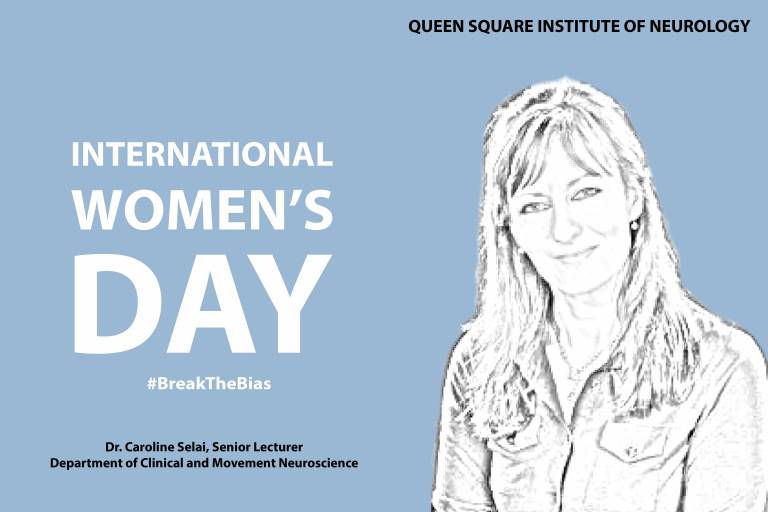
Can you give us an overview of your current position and explain what was your career path to this role?
I am currently Associate Professor (Senior Lecturer) in the QSIoN Research Department of Clinical and Movement Neurosciences. I am also based in the QSIoN Education Team.
I completed my PhD at Queen Square in the Raymond Way Neuropsychiatry Unit, under the supervision of Professor Michael Trimble. After my PhD I got my first teaching role at QSIoN, became a Chartered Psychologist and Associate Fellow of the British Psychological Society, was promoted to Senior Lecturer in 2003 and became the Academic Head of the (then) Queen Square Institute of Neurology (ION) Education Unit when it was established on 01-May-2006. I have held many roles including Faculty Sub-Dean.
Clinically I work as Honorary Psychologist at the National Hospital for Neurology and Neurosurgery in a liaison role between the clinical departments of Neuropsychiatry and Uro-Neurology. With my colleague Dr. Jalesh Panicker I have set up a Psychology service in the department of Uro-neurology. I also work with Dr. Michael Moutoussis and colleagues in the Department of Neuropsychiatry ‘Queen Square Guided Self Help’ service which provides Preparatory Therapy for patients with Functional Neurological Symptom Disorder (FNDS) who are preparing to come to The National Hospital for the 4-week in-patient, multi-disciplinary team (MDT) therapy. In a recent development prompted by the covid pandemic, we have been offering group psychotherapy on zoom.
Can you tell us about a piece of work that you are particularly proud of?
I have been pleased with quite a few of my achievements including helping Professor Roger Lemon to develop QSIoN’s very first MSc programme MSc Clinical Neuroscience which launched in 1998/1999. Professor Richard Frackowiak and I set up the Dual Masters in Brain and Mind Sciences programme, a two-year Masters course run by UCL in partnership with Sorbonne Université and the Ecole Normale Superieure, Paris. I am still Co-Director of these two programmes today. I also co-founded the UCL Cultural Consultation Service www.ucl.ac.uk/ccs on 1st November 2011.
However, I am particularly proud of my work helping students with mental health difficulties to achieve their Masters degree. Every year a small number of students find themselves struggling either because of a newly emerging MH difficulty or an exacerbation of a pre-existing health condition. Sometimes the trigger is a major life-event such as a bereavement. Because the issues are confidential this work is usually under the radar. It is very rewarding to support these students - and in some cases to mentor their tutors and supervisors who are also keen for support. We presented on some of this this work at the UCL Education conference last year:
Selai, C, Male, R, Kinsella, F, Li, W & Moutoussis, M. (2020) Title: Intersectional Experiences: opportunities for change..? Calling Time on Sexual Misconduct: best practice prevention in higher education. UCL Education conference: 17-18th June 2020.
This year’s theme for international women’s day is “Break the Bias”. What bias would you like to break?
In my clinical work I see many patients with Functional Neurological Symptom Disorder (FNSD) who have been disbelieved, dismissed or ignored by health care professionals and family members. FNDS affects more women than men and these patients been heavily stigmatised. I would like to see these patients treated with empathy and understanding. We need to break this bias.
What advice would you give to your younger self?
Looking back I was very anxious about all sorts of things. I would say ‘don’t worry – things will work out’.
Who is a female role model to you? Why?
My Grand-mother Dorothy Rose was a role model to me. She was fiercely independent, broke all the rules and (important for the time), she did not worry what other people thought of her. She joined a men’s cycling club and wore trousers when cycling which caused such outrage that, when touring around the UK, she was banned from entering some villages!
Do you feel you have a good work/life balance? Why?
In June this year I will be coming to the end of an intense 2-year training course. I have had coursework, reading, written assignments… After this Summer, I look forward to regaining a better work / life balance. My husband Jamie is looking forward to this too!
What is your favourite thing to do in your spare time?
At the moment it is reading (see above) and playing dinosaurs with my (4 year-old) Great-niece Tilly. Before the Covid pandemic I loved to visit art galleries but have not been in over 2 years! I am looking forward to getting out and about again this Summer.
 Close
Close

